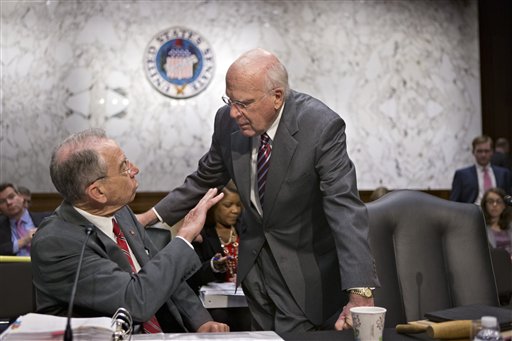By DAVID ESPO and ERICA WERNER
Associated Press
WASHINGTON
Far-reaching legislation to grant a chance at citizenship to millions of immigrants living illegally in the United States cleared the Senate Judiciary Committee on a solid bipartisan vote Tuesday night after supporters somberly sidestepped a controversy over the rights of gay spouses.
The 13-5 vote cleared the way for an epic showdown on the Senate floor on the measure, which is one of President Barack Obama’s top domestic priorities yet also gives the Republican Party a chance to recast itself as more appealing to minorities.
The committee’s action sparked rejoicing from immigration activists who crowded into a Senate committee room to witness the proceedings. “Yes, we can!” they shouted as they clapped rhythmically to show their pleasure.
In addition to creating a pathway to citizenship for 11.5 million immigrants, the legislation creates a new program for low-skilled foreign labor and would permit highly skilled workers into the country at far higher levels than is currently the case.
At the same time, it requires the government to take costly new steps to guard against future illegal immigration.
There was suspense to the end of the committee’s deliberations, when Sen. Patrick Leahy, the Vermont Democrat who serves as chairman, sparked a debate over his proposal to give same-sex and heterosexual spouses equal rights under immigration law.
In response, he heard a chorus of pleas from the bill’s supporters, seconding private appeals from the White House, not to force a vote that they warned would lead to the bill’s demise.
In the hours leading to a final vote, the panel also agreed to a last-minute compromise covering an increase in the visa program for high-tech workers, a deal that brought Sen. Orrin Hatch, R-Utah over to the ranks of supporters.
Under the compromise, the number of highly skilled workers admitted to the country would rise from 65,000 annually to 110,000, with the possibility of a further rise to 180,000, depending in part on unemployment levels.
Firms where foreign labor accounts for at least 15 percent of the skilled work force would be subjected to tighter conditions than companies less dependent on H-IB visa holders.
The compromise was negotiated by Hatch, whose state is home to a growing high tech industry, and Sen. Chuck Schumer, D-N.Y. It is designed to balance the interests of industry, which relies increasingly on skilled foreign labor, and organized labor, which represents American workers.
AFL-CIO President Rich Trumka attacked the deal sharply as “anti-worker,” although he also made clear organized labor would continue to support the overall legislation.
Robert Hoffman, senior vice president for government affairs at the Information Technology Industry Council, welcomed the deal. “We obviously want to keep moving the bill forward and building support for the legislation, and this agreement allows us to do so,” he said.
The issue of same-sex spouses hovered in the background from the start, and as the committee neared the end of its work, officials said Leahy had been informed that both the White House and Senate Democrats hoped he would not risk the destruction of months of painstaking work by putting the issue to a vote.
A few hours later, Republicans and Democrats both answered his question bluntly.
Republicans and Democrats alike also noted that the Supreme Court may soon issue a ruling that renders the controversy moot.
Despite the concern that bipartisan support for the legislation was fragile, there was no doubting the command over committee proceedings that backers held.
In a final reminder, an attempt by Sen. Ted Cruz., R-Texas, to delete the pathway to citizenship failed on a 13-5 vote.
In defeat, he and others said they, too, wanted to overhaul immigration law, but not the way that drafters of the legislation had done.
Sen. Charles Grassley, R-Iowa, recalled that he had voted to give “amnesty” to those in the country illegally in 1986, the last time Congress took a major look at immigration. He said that bill, like the current one, promised to crack down on illegal immigration, but said it had failed to do so.
The centerpiece provision of the legislation allows an estimated 11 million people living in the U.S. illegally to obtain “registered provisional immigrant status” six months after enactment if certain conditions are also met.
Applicants must have arrived in the United States before Dec. 31, 2011, and maintained continuous physical presence, must not have a felony conviction of more than two misdemeanors on their record, and pay a $500 fine.
The registered provisional immigrant status lasts six years and is renewable for another $500. After a decade, though, individuals could seek a green card and lawful permanent resident status if they are up to date on their taxes and pay a $1,000 fine and meet other conditions.
Individuals brought to the country as youths would be able to apply for green cards in five years.
___
AP White House Correspondent Julie Pace contributed to this report.

COMMENTS
Please let us know if you're having issues with commenting.